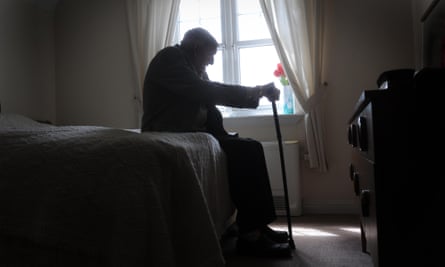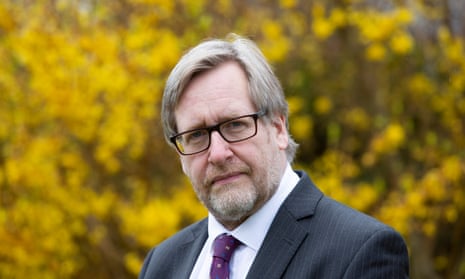With the coronavirus crisis forcing us to confront profound questions about care priorities and the relative worth of citizen’s lives, Donald Macaskill has emerged as a doughty and passionate advocate for older people. “They are not disposable,” he insists. “They are the best of us – and we have a duty to be the best for them.”
Macaskill is chief executive of Scottish Care, the main umbrella body for care homes and homecare providers in Scotland, and has long argued for a human-rights approach to care and support. The crisis has rushed the issue to the fore, with growing reports of older and disabled people being earmarked automatically for palliative care only, should they contract Covid-19.
To Macaskill, the emergency represents the biggest human-rights challenge since the second world war. “I have never been, nor would I want to be, in a situation where I needed to make that life-or-death decision,” he says. “But if I was, what I would want is very clear guidance so I knew that somebody had my back. What concerns me is that some of the guidance already beginning to appear around the country is misplaced, immoral and illegal.”
Advice for doctors published last week by the British Medical Association says that patient age, “where clinically relevant”, could be a factor in predicting survival in decisions about extending or withholding more intensive treatment, including access to ventilators to support breathing.
“Age cannot be the sole proxy [for worth], indeed it should not be the primary proxy,” says Macaskill. “There are many active people in their 70s who would have more beneficial clinical outcomes than, say, somebody in their 50s living with multiple co-morbidities.”
The extent of any underlying chronic health conditions, as well as frailty “should have greater significance than simply age when you have that hellish decision to make”, he adds.
Macaskill is calling for an immediate initiative to draw up agreed national guidance, with a process involving not just acute-care doctors and ethicists but also geriatricians, gerontologists and social-care leaders. He believes it could be completed, virtually, within 48 hours. But he says the leadership of politicians would be crucial.
“We should not be leaving this to the clinicians. Critically, they are the ones who are going to have to make and action the heavy choices. We need greater political intervention in the debate and politicians – with one or two glorious exceptions – have been remarkably quiet around all this.”
At Scottish Care, Macaskill – who has a background in further and higher education and faith studies – seeks to apply a human-rights test to all policies and practice. He says he is dismayed by those who wish to scrap the Human Rights Act and dilute the UK’s commitment to the European convention on human rights. “It’s a historical failure to realise where the modern system of human rights came from, which inescapably was the horrors of the second world war.”

Since the coronavirus crisis broke, Macaskill has attracted attention not only for his forceful stance on older people’s right to life, but also for taking on the leading supermarket chains for not giving social-care workers the same access to protected shopping time that they have made available to NHS staff.
“We have staff coming off 12-hour shifts, struggling to get into the local Tesco because at that very time it’s the shopping hour for the NHS,” he says. Smaller care homes that have always shopped locally for supplies, supporting their high street, have also found themselves unable to get what they need. “They have tried to do the right thing, rather than buy from big multinational chains, and it’s come back to bite them.”
Does he think the health and care sector can withstand the crisis? Scotland, he believes, is slightly better placed than the rest of the UK thanks to its relatively small size, greater past investment – with social-care pay higher and vacancy rates lower than in England – and earlier planning for the emergency.
But coronavirus is already in what he terms “a good number” of care homes, including Burlington Court in Glasgow where 16 deaths in just over a week have been linked to the disease. “People are frightened that this virus will strike the most vulnerable and strike in the heart of their care home communities,” he says.
He thinks availability of personal protection equipment (PPE) has so far been better than in England, owing to a coordinated distribution model across social care and the NHS. But the picture remains far from ideal, he stresses, and following reports at the weekend of the death of a care worker in West Dumbartonshire he tweeted: “This is truly tragic. We must make sure frontline care workers have all the PPE they need.”
Macaskill warns that health and care will get through only if social care is treated on a par with the health service when it comes to such issues as PPE distribution. “What I am very clear on is that if social care remains the handmaiden of the NHS, rather than being seen as an equal sister, then we will not achieve the positive outcomes we all want to see,” he says. “Social care has to be valued in its own right because it is critical to us beating the virus in the community generally, but in care homes in particular.”
The increasingly traumatic events of the past few weeks have helped social care belatedly start to earn proper recognition in policy circles, he thinks. But he fears there remains “a huge distance to travel” in winning it equal status with the NHS in the public mind.
“This crisis will certainly help that,” Macaskill says. “But will it completely change things? I suspect not.”
Curriculum vitae
Age: 55.
Lives: Ayrshire.
Family: Married with two daughters.
Education: Hillhead high school, Glasgow; University of Glasgow (MA history, BD divinity, PhD psychology & sociology).
Career: 2016-present: chief executive, Scottish Care; 2009-16: founder/director, Equal and Diverse consultancy; 2004-09: head of learning and training, Scottish Human Services Trust; 2001-04: social work project manager, CKUK Common Knowledge; 1990-2001: associate vice-principal, programme director & lecturer, Scottish Churches Open College, Edinburgh Napier University.
Interests: Music, wine, gardening, poetry.

Comments (…)
Sign in or create your Guardian account to join the discussion